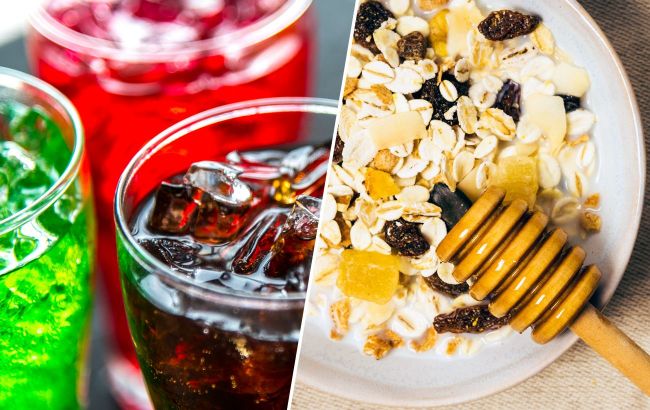Products with hidden dangerous added sugars
 RBC-Ukraine collage
RBC-Ukraine collage
Added sugar is present in many food products. It is dangerous because it provides the body with fast carbohydrates, and in the long run, it can lead to obesity, cardiovascular diseases, and diabetes, according to dietitian Olha Bezuhla.
Added sugar and its harm
According to the expert, our body should not receive carbohydrates from added sugar. That's why in the healthy eating pyramid, sweet drinks and sweets are recommended to be consumed moderately or eliminated altogether.
Although we sometimes add sweeteners such as honey to food or drinks, most of the sugar comes from processed and ready-made products.
The main sources of added sugar are sweetened drinks, desserts, and sweet snacks, such as ice cream, pastries, and cookies. Less obvious but important sources include dry cereals, yogurts, and sauces.
How much added sugar can be consumed
Dietary recommendations advise everyone aged 2 and older to limit sugar intake in their diet to less than 10% of total calories. For a 2000-calorie diet, this means 200 calories or 50 grams of sugar per day (12 teaspoons of sugar).
Infants and young children under 2 years old should not be given solid food or drinks with any added sugar.
The American Heart Association (AHA) recommends reducing sugar consumption to help slow down obesity and heart disease.
They propose a stricter limit on added sugar - no more than 100 calories per day (about 6 teaspoons or 24 grams) for most adult women and no more than 150 calories per day (about 9 teaspoons or 36 grams of sugar) for most men.
AHA also recommends reducing the daily limit of added sugar for children aged 2 to 18 to less than 6 teaspoons or 24 grams per day.
Products with added sugar
Sweet drinks. Sugary drinks are a major source of excess calories that can contribute to weight gain and provide no nutritional benefit. Research shows that liquid carbohydrates, such as sugar-sweetened drinks, are less satiating than solid food, causing people to continue feeling hungry after consuming them, despite their high calorie content.
They are closely monitored for their contribution to the development of type 2 diabetes, heart disease, and other chronic conditions.
An average bottle of 0.5 liters of sugar-sweetened carbonated water, lemonade, or iced tea contains about 65 grams of added sugar, often from high-fructose corn syrup. This is equivalent to 16 teaspoons of table sugar.
Cereals and other food products. Choosing minimally processed breakfast foods, such as whole grain toast with nut butter or a bowl of oatmeal, is a great way to avoid adding sugar.
Unfortunately, many common breakfast products, such as ready-made dry cereals, cereal bars, instant oatmeal with flavorings, and baked goods, can contain a large amount of added sugar.
Be cautious
Some ingredient lists disguise the amount of sugar in a product. To avoid listing sugar as the first ingredient, food manufacturers may use different forms of sugar - each with its own name - and list each of them separately on the nutrition label.
"But let's not deceive ourselves: our body metabolizes all added sugars the same way, as it makes no distinction between brown sugar, corn syrup, honey, and other calorie sweeteners. When reading the label, make sure you see all sources of added sugar, even if they are not listed first in the ingredient list," advises Olha Bezuhla.
A good rule is to avoid products with a high amount of added sugar, including not consuming products where sugar is listed as the first or second ingredient.
However, products may use various sweeteners, so be sure to check the full list of ingredients.
This material is for informational purposes only and should not be used for medical diagnosis or self-treatment. Our goal is to provide readers with accurate information about symptoms, causes, and methods of detecting diseases. RBС-Ukraine is not responsible for any diagnoses that readers may make based on materials from the resource. We do not recommend self-treatment and advise consulting a doctor in case of any health concerns.

